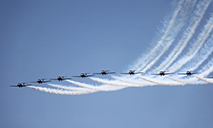"Endless wars" U.S. launched on terror cost much more than 9/11 attacks -- Nye
Twenty years after 9/11, these are the lessons we should be learning and the plans we should be making.
WASHINGTON, Sept. 8 (Xinhua) -- While the 9/11 attacks killed several thousand Americans, the "endless wars" that the U.S. launched as part of the global war on terror "cost much more," renowned Harvard University professor Joseph S. Nye has said.
"The damage done by Al-Qaeda pales compared to the damage we did to ourselves," Nye, dean emeritus of Harvard University's John F. Kennedy School of Government, told Xinhua in an email interview.
By some estimates, nearly 15,000 American military members and contractors were killed and the economic cost of the wars that followed 9/11 was more than 6 trillion U.S. dollars, Nye said. "Add to this the number of foreign civilians killed and refugees created and the costs were enormous."
"The opportunity costs were also large. When President Barack Obama tried to pivot to Asia -- the fastest growing part of the world economy -- the legacy of the global war on terror kept the U.S. mired in the Middle East," said Nye.
"The problems of terrorism remain" though some say that despite these costs, the United States prevailed in the global war on terror with Bin Laden and many of his top lieutenants killed, and there has not been another major terrorist attack on the U.S. homeland with the scale of 9/11, he noted.

U.S. national flags fly at half-mast at the Washington Monument in commemoration of the 19th anniversary of the 9/11 attacks in Washington, D.C., the United States, on Sept. 11, 2020. (Xinhua/Liu Jie)
LESSONS FOR U.S.
"Looking forward, when the next terrorist attacks come, will presidents be able to channel public demand for revenge by precise targeting, explaining the trap that terrorists set for us, and focusing on creating resilience in American responses," said Nye.
"Twenty years after 9/11, these are the lessons we should be learning and the plans we should be making," he said.
As a counterfactual history of the past 20 years, imagine what the world would be like if U.S. President George W. Bush had avoided the tempting rallying cry of a global war on terror and responded to 9/11 by carefully selected military strikes combined with good intelligence and diplomacy, said Nye.
Or, if he had gone into Afghanistan, imagine that he had got out after six months, even if that had involved negotiating with the Taliban, he said.
"What 9/11 illustrates is that terrorism is about psychology, not damage," said Nye.

The Tribute in Light art installation is presented to symbolize the Twin Towers at the World Trade Center site in New York, the United States, Sept. 11, 2020. (Xinhua/Wang Ying)
The professor said he believes that "future historians will regard Sept. 11, 2001 as important as Pearl Harbor was on Dec. 7, 1941." The surprise Japanese attack on Pearl Harbor killed some 2,400 American military personnel and destroyed or damaged 19 naval craft including eight battleships.
"In both cases, however, the main effect was on public psychology," said Nye.
"The 9/11 terrorist attacks were a horrific shock to our psyches. Images of victims jumping from towers are indelible, and intrusive security measures disrupted our lives," he said.
For years, President Franklin D. Roosevelt had tried to alert Americans to the Axis threat but failed to overcome isolationism, and all that changed with Pearl Harbor, according to the professor.
In the 2000 presidential election, George W. Bush advocated a humble foreign policy and warned against the temptations of nation-building, but after the shock of 9/11, he declared a "Global War on Terror" and invaded both Afghanistan and Iraq, Nye said.
"Given the proclivities of top members of his administration, some say a clash with (then Iraqi President) Saddam Hussein was predictable in any case, but probably not in same manner and level of cost," said Nye.
Photos
Related Stories
- COVID-19 runs wild in U.S., peak yet to be seen
- Real structural racism exists in U.S. public school systems: media
- Stephen Orlins: A good US-China relations are in the interest of the American people
- Scapegoating China merely U.S. political tool: observer
- White House calls on Congress to pass short-term funding bill to avoid gov't shutdown
Copyright © 2021 People's Daily Online. All Rights Reserved.










